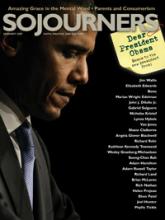TechMission, the Christian nonprofit I lead, was founded out of black and Latino churches and ministries that often found themselves on the wrong side of the “digital divide.” They lacked Web sites and computers, and church members were finding it increasingly difficult to get jobs without computer skills. So Bruce Wall Ministries, a community organization in Dorchester, Massachusetts, began a training program that provided computer classes to thousands of at-risk youth and unemployed adults.
But as more people get online, they are encountering another type of digital divide: the online segregation of Christians. As Martin Luther King Jr. famously said, “Eleven o’clock Sunday morning is the most segregated hour in America.” Most Christians are friends with and worship largely with people of their own racial background. We are segregated not only by race, but also by social class and income. As a result of injustice, the average income and wealth of African-American and Latino Christians are lower than that of white Christians.
As the recent book Divided by Faith points out, the segregation of the church results in a separation between rich and poor communities, which in turn perpetuates injustice. For example, a church member in a very resourced church who is looking for a job may get 10 referrals from friends in the church, whereas someone in a church where half of the attendees are unemployed might not get any referrals.
Read the Full Article
